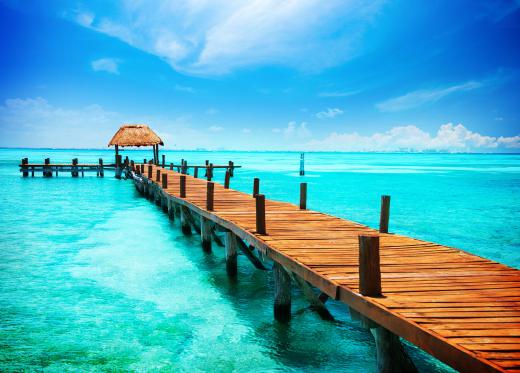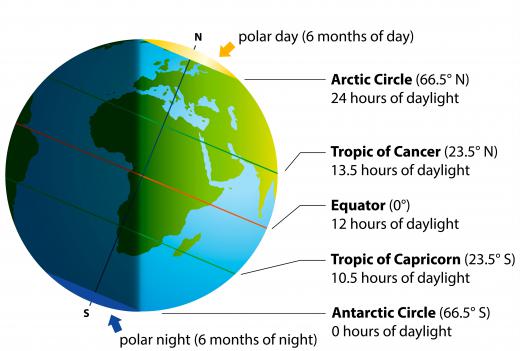What is Tropical Ecology?
 Mary McMahon
Mary McMahon
Tropical ecology is a field which focuses on the ecology of the tropics, an immensely biodiverse region bounded by the Tropic of Capricorn and the Tropic of Cancer. Although people often think of the tropical rainforest when they hear the term “tropics,” tropical ecosystems are actually quite varied, and include dry forests, deserts, and other types of ecosystems. Tropical ecologists, like other ecologists, are interested in the natural environment and the complex relationships of the organisms which inhabit it.
The study of tropical ecology is a very rich field within the sciences. Some types of ecosystems found in the tropics include cloud forests, dry forests, rainforests, deserts, and deciduous forests, among others, and each is very unique. The tropical climate is quite varied, ranging from very cold, dry weather on mountain peaks in the tropics to hot, humid weather in tropical valleys. Tropical ecologists can choose to study many tropical ecosystems, or to focus on a particular region or ecosystem of interest.

Ecologists look at plants, animals, insects, microorganisms, soil, and climate to learn how ecosystems form, and how they remain stable. In tropical ecology, researchers are also interested in the impact of human activities such as logging, tourism, and settlements on the environment, and ways in which humans can use the environment sustainably. Because many tropical ecosystems are very unique and irreplaceable, researchers are especially concerned about imbalances and damage in vulnerable areas.

A tropical ecologist might study something like an endangered animal which inhabits a tropical environment, looking at how that animal interacts with the environment and developing policy recommendations which could help to preserve the animal and the ecosystem it inhabits. Other tropical ecologists focus on helping people use the tropical environment effectively, restoring damaged tropical ecosystems, identifying new species in the tropics, and studying the impact of climate change on tropical ecology.

To work in the field of tropical ecology, someone must generally hold at least a bachelor's degree in ecology, with many researchers holding higher degrees. Tropical ecologists spend a lot of time in the field, working and living in the ecosystems they study and collecting information which can be published and distributed. They may also spend time in the lab, conducting analysis of samples taken from the field, and they can work for conservation organizations, governments, and private consulting companies. Some tropical ecologists focus on public relations, using their knowledge to inform members of the public about ecological issues, while others are more interested in focusing on research.
AS FEATURED ON:
AS FEATURED ON:


















Discussion Comments
@Fa5t3r - That might be true to some extent but it would still be better for everyone if we just tried to stop the problem before it gets worse. Coral reefs are only a very charismatic example of the problems that we're going to have if tropical ecosystems are upset around the world.
They tend to have the richest diversity of species and once they are gone, they are gone forever.
@croydon - It might be too late for the reefs, although I am still hopeful there will be some kind of breakthrough that can save them.
I do think that there will be ways to save the majority of the reef ecosystem though. People make artificial reefs all the time, either by accident or on purpose. One of the major benefits of the study of ecology is that we'll be able to think of solutions to these problems.
Unfortunately, climate change is going to end up hitting tropical ecology very hard, because a lot of the organisms in the tropics are living on the edge of what is ideal temperatures as it is.
An example of that is the coral reefs. I've heard very dire predictions recently about their ability to survive and it seems like twenty years is the average amount of time they are given. With temperatures rising and the chemical composition of the ocean changing, they simply won't be able to live in the altered environment and they grow so slowly, there's no way they can move either. Which means that the fish that live in them are pretty much going to go extinct as well. It's a terrifying thought.
Post your comments